The kind of hosting you use is just as important as the content you put on your website.
The right hosting arrangement can give your business the foundation it needs to grow. But the wrong hosting type can hamper growth and interfere with your business operations.
So, how do you choose the right type of server hosting? For enterprise organizations with demanding hosting requirements, the recommended option is a dedicated server that offers more flexibility and control.
But there’s still one more decision to make — whether you should use managed or unmanaged server hosting.
This guide goes over everything you should know about the two options and the best use cases for each hosting type.
- Managed vs. unmanaged hosting
- Managed vs. unmanaged hosting: Which option is best for you?
- Server hosting options offered by Nexcess
- Final thoughts: Managed vs. unmanaged servers — what’s the best choice for you?
Managed vs. unmanaged hosting
Unmanaged (also called self-managed) server hosting is a form of hosting where the customer bears full responsibility for managing and maintaining the server that comes with the hosting package. But with managed server hosting, the hosting provider takes care of server management and maintenance.
Let’s look at these types of hosting in more detail.
With an unmanaged hosting plan, the web host provisions the server and installs the operating system. Then, you take over the controls.

The web hosting company handles the physical maintenance and ensures the server remains online and available. You take care of everything else. Because a higher degree of technical expertise is needed, unmanaged hosting is most commonly offered in the VPS and dedicated server realm.
With unmanaged hosting, you're responsible for:
- Operating system updates.
- Installation and configuration of web services.
- Security patches.
- Monitoring.
- Responding to security incidents.
Unmanaged hosting is a bit like making a meal from scratch. You assemble your ingredients and adjust the recipe to your preferences. And while you eat, you can add more seasoning if needed.
With managed server hosting, things are a bit different. The hosting company provides additional managed services, like security monitoring, software installations, backups, and improved customer support.

In other words, the web hosting provider will take care of all the technical parts of the server in a managed server hosting plan. That way, you can focus on running your web applications and your business’s needs.
If you encounter problems while using the server, technical support is available to help fix them. That way, your website keeps running smoothly.
If unmanaged hosting is like cooking from scratch, then managed hosting is like going to a restaurant.
You order a meal, and the chef prepares it to your preferences. When it's ready, the server brings it to your table. While you eat, the waitstaff is around to help with any questions or issues with your meal.
Advantages and disadvantages of unmanaged server hosting
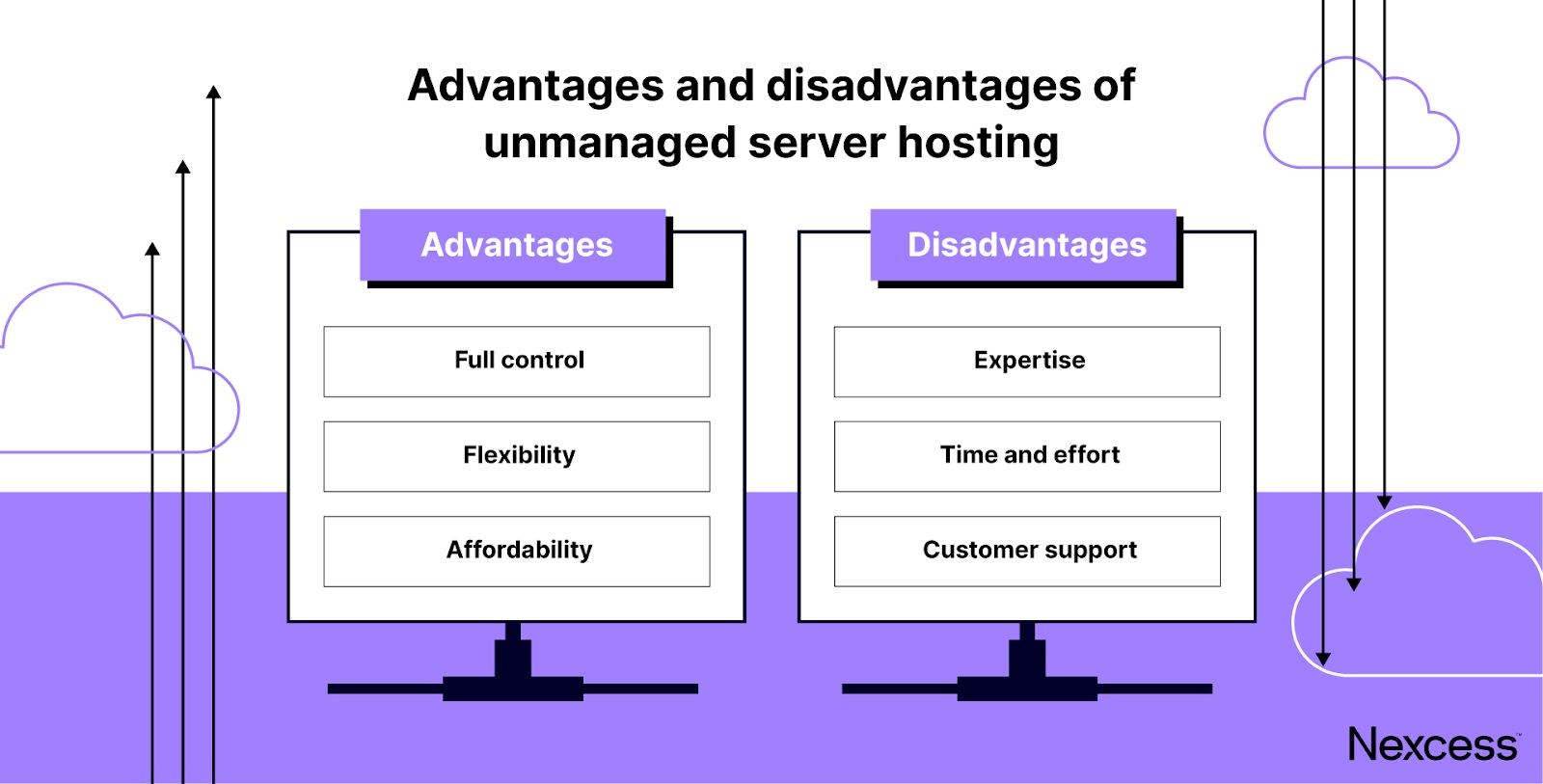
Unmanaged server hosting comes with several advantages. They include:
- Full control: The primary advantage of unmanaged hosting is that it grants you complete control of your own server. This level of control is perfect for advanced users and businesses that need root access for their web apps.
- Flexibility: With an unmanaged server, you don’t use a template of features and applications. Instead, you choose what you want to include in your web hosting environment. For example, you can decide which control panel application to install and which security monitoring tools to use.
- Affordability: Hosting with unmanaged servers is more affordable than using managed servers. The extra services and features add to the cost of managed hosting plans.
However, there also are some downsides to choosing this type of hosting. The disadvantages include:
- Expertise: Using unmanaged servers requires advanced knowledge of server management. Your IT team needs to be able to configure and manage your server to keep things running smoothly.
- Time and effort: Unmanaged servers require more time and effort to keep them functioning. All the maintenance and support tasks typically handled by the hosting provider with managed plans are the responsibility of you or your IT team. This can quickly get expensive if your business needs an in-house team just for server maintenance.
- Customer support: There’s limited customer support available for most unmanaged server packages. So, unmanaged customers need to be able to resolve most of the issues they experience on their own. In contrast, managed plans usually come with 24/7 access to customer support.
Advantages and disadvantages of managed server hosting
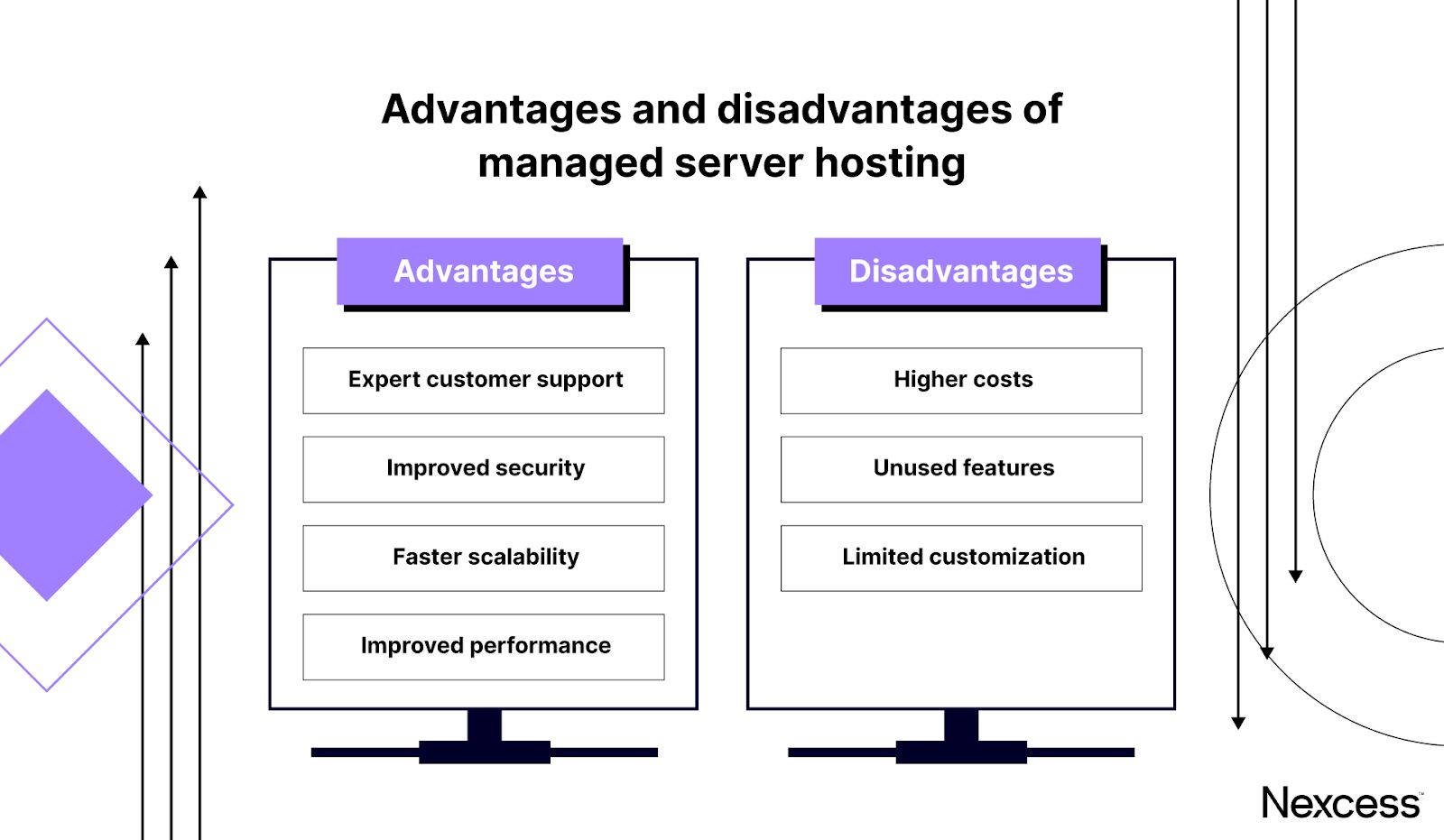
Now, let’s look at managed server hosting in more detail. The benefits of this type of plan include:
- Expert customer support: Managed server plans include access to a team of experienced support professionals who are well-versed in server management. They can assist with troubleshooting, server configuration, software installations, and performance optimizations. They’ll ensure that your server operates smoothly.
- Improved security: Managed server hosting plans include 24/7 systems for server performance and security. The hosting provider manages security features like firewalls, automated backups, and compliance with cybersecurity standards like PCI-DSS. These features ensure the maximum availability of the servers.
- Faster scalability: Managed hosting is better able to scale to meet your needs. This is because real-time performance monitoring is part of the features of managed plans. A managed hosting provider can anticipate and adjust its server resources — like CPU, storage, and bandwidth — based on your needs.
- Improved performance: Managed hosting plans come with server optimizations like caching, content delivery networks (CDNs), and autoscaling. These features help you maximize your infrastructure performance out of the gate.
Despite these advantages, managed plans have some downsides. They include:
- Higher costs: The month-to-month cost of managed hosting is much higher compared to unmanaged hosting. This could be a strain on smaller businesses with budget constraints.
- Unused features: Managed hosting plans can include some features you don’t need. For instance, you may need the additional security and monitoring features. But you may already have a solution for content delivery — or don’t need it at all.
- Limited customization: Managed servers may not offer enough flexibility for businesses that require a high level of control and customization. To get around this, you can choose a managed plan that lets you customize your application stack and server architecture.
Get fully managed enterprise hosting
Nexcess provides stronger scalability, security, & expert hosting support
Managed vs. unmanaged hosting: Which option is best for you?
Managed and unmanaged hosting servers both have pros and cons. So, how do you select the right option for your business? Here are some things to consider before you make a decision.
Budget
How much your business is willing to spend will affect the type of hosting plan you can choose. One thing that’s clear is that the pricing for managed hosting servers is generally higher than for unmanaged servers. This holds true regardless of whether you go with dedicated or VPS hosting.
Even if you opt for a hosting company that has comparatively cheaper plans, its managed hosting options will still cost more than its unmanaged plans. Starting prices for unmanaged dedicated servers can be as low as $41/month. Managed dedicated servers start around $110 to $150/month.
Another factor to consider is whether the extra services that come with a managed server are a good value. Third-party vendors offer some features included with managed server plans, like daily backups, CDNs, and security monitoring.
This is especially important if you don’t need all the add-ons that come with the managed plan. You could pay the lower cost of an unmanaged plan and use a third party for the additional features you need.
As far as the price of servers is concerned, unmanaged hosting is best for smaller businesses that want to cut costs. Managed hosting is best for enterprises that have more funds to commit to hosting infrastructure and prefer to bundle these features.
A final factor to consider when looking at your budget is your IT staff. If you go with an unmanaged plan, you may need to hire additional employees to manage your server.
Web application requirements
Your website or web application requirements also will affect your choice. Hosting servers can handle a wide variety of workloads efficiently. However, some unique requirements work better with either managed or unmanaged hosting.
Managed hosting may be a better option if you host an ecommerce website with a lot of products and internet traffic that fluctuates based on the season.
Features like live security monitoring will ensure your website is safe from attacks. And scalable bandwidth can adjust to match your website’s traffic demands. Some managed hosting servers are even optimized specifically for ecommerce workloads.
But what if you need hosting servers with full root access to make special configurations for a secure web application?
In that case, an unmanaged server will give you the level of access and customization you need. You will also have full control over creating user accounts and system access.
Technical knowledge
One key component of most managed server plans is access to 24/7 customer support via email, chat, and sometimes phone calls. The support team’s primary responsibility is to help customers overcome challenges with their configuration or day-to-day use of the hosting servers.
If you have an in-house IT team, they may be capable of configuring and maintaining a server. In this case, the level of support that comes with managed hosting may not be necessary. You may want to go with an unmanaged server and save the company some money in the process.
But say your business doesn’t have an IT team. Or maybe you have a smaller team and prefer to outsource your server’s management. In that case, managed hosting is the preferred solution. It provides the infrastructure and technical support needed to keep your server running smoothly.
Server hosting options offered by Nexcess
Nexcess offers a range of managed server options tailored for specific use cases. Here are the details of each option.
Ecommerce enterprise solutions
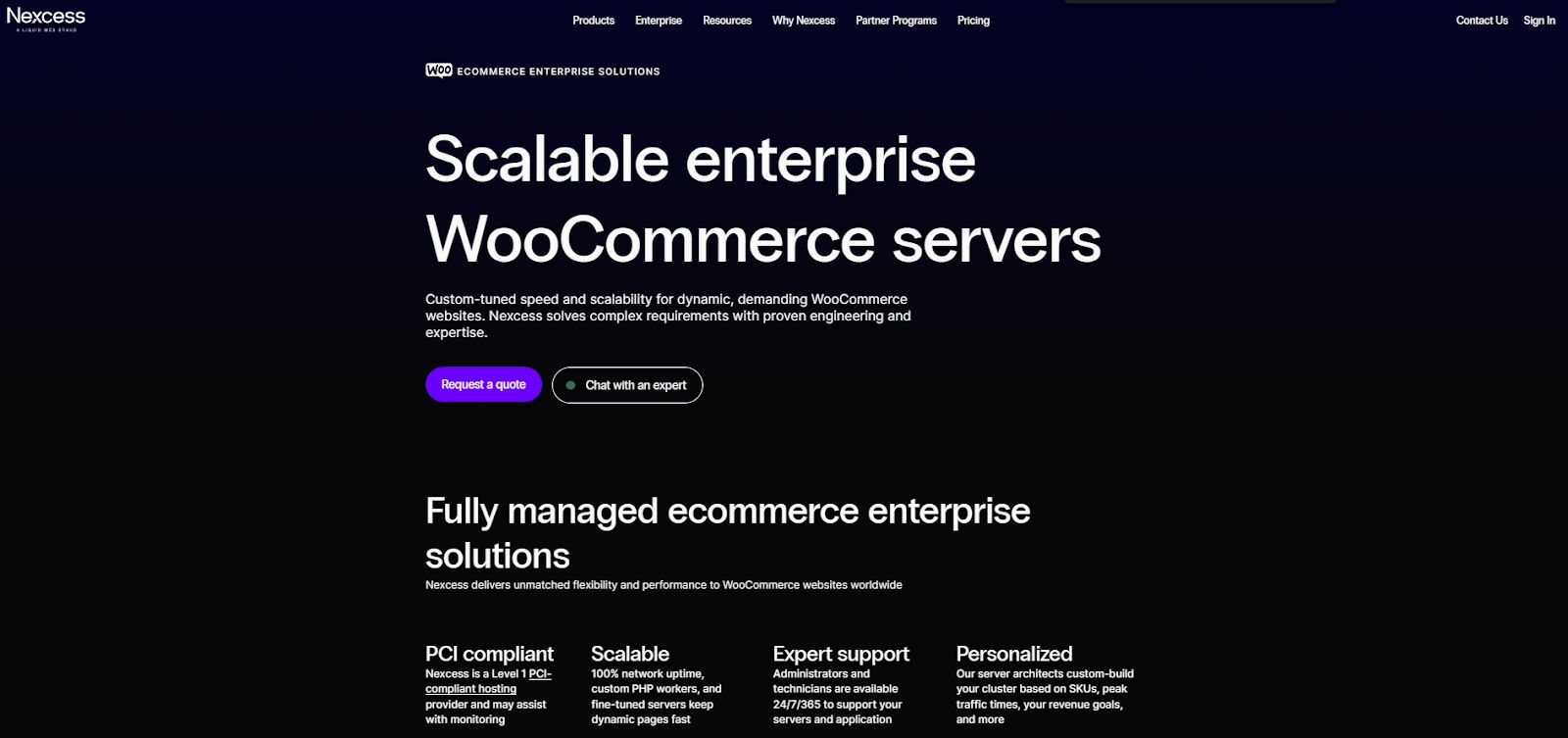
Nexcess offers custom-tuned servers optimized to handle demanding WooCommerce websites.
This ecommerce enterprise solution lets you choose from a host of server configurations — like bare-metal, cloud, and load-balanced clusters — based on your performance needs.
You can seamlessly migrate your existing WooCommerce store’s data to Nexcess. Or you can take advantage of the extended developer support feature to build from the ground up.
This hosting option also includes automated operating system and software updates, daily backups and malware scanning, and firewalls for improved security.
In addition, Nexcess provides proactive monitoring to identify and resolve issues promptly. This feature minimizes downtimes and ensures a seamless shopping experience for your customers.
This ecommerce enterprise solution also is scalable. As a result, your online store can easily handle increased traffic during peak periods, such as seasonal sales or promotional events.
Enterprise WordPress hosting
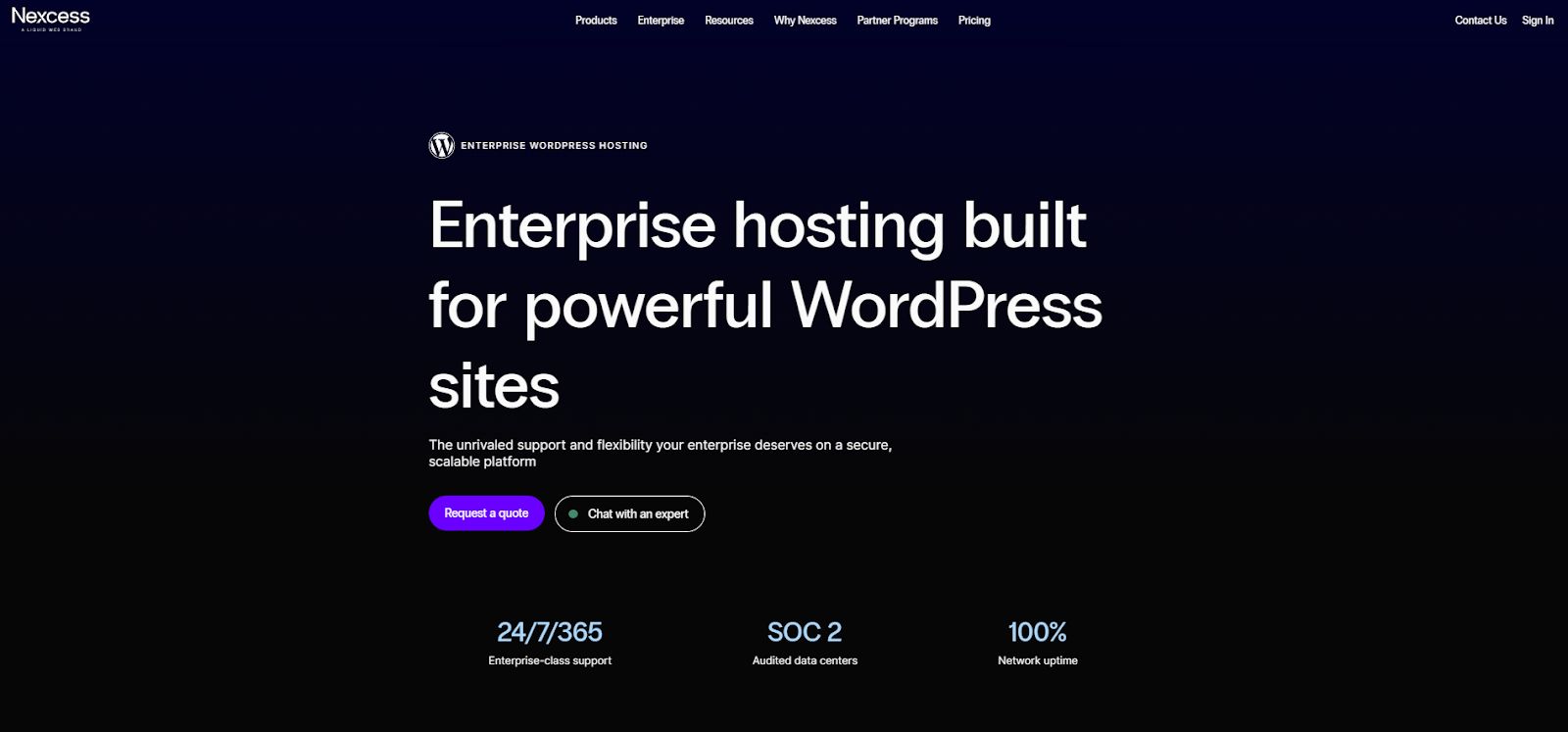
The enterprise WordPress hosting plans from Nexcess offer the high-speed infrastructure, security, and scalability needed for WordPress websites.
You can use either hardware or cloud hosting servers configured by a team of veteran system administrators to meet your requirements. These servers also comply with the Service Organization Control Type 2 (SOC 2) framework for cybersecurity.
These plans also come with:
- Server-level caching.
- Free staging websites.
- Access to premium WordPress plugins.
- Automated backups.
- Dedicated IP addresses.
- Free SSL certificates.
Nexcess handles the front-end and back-end maintenance of your server. Plus, the team will install software updates and security patches as needed.
Magento enterprise hosting
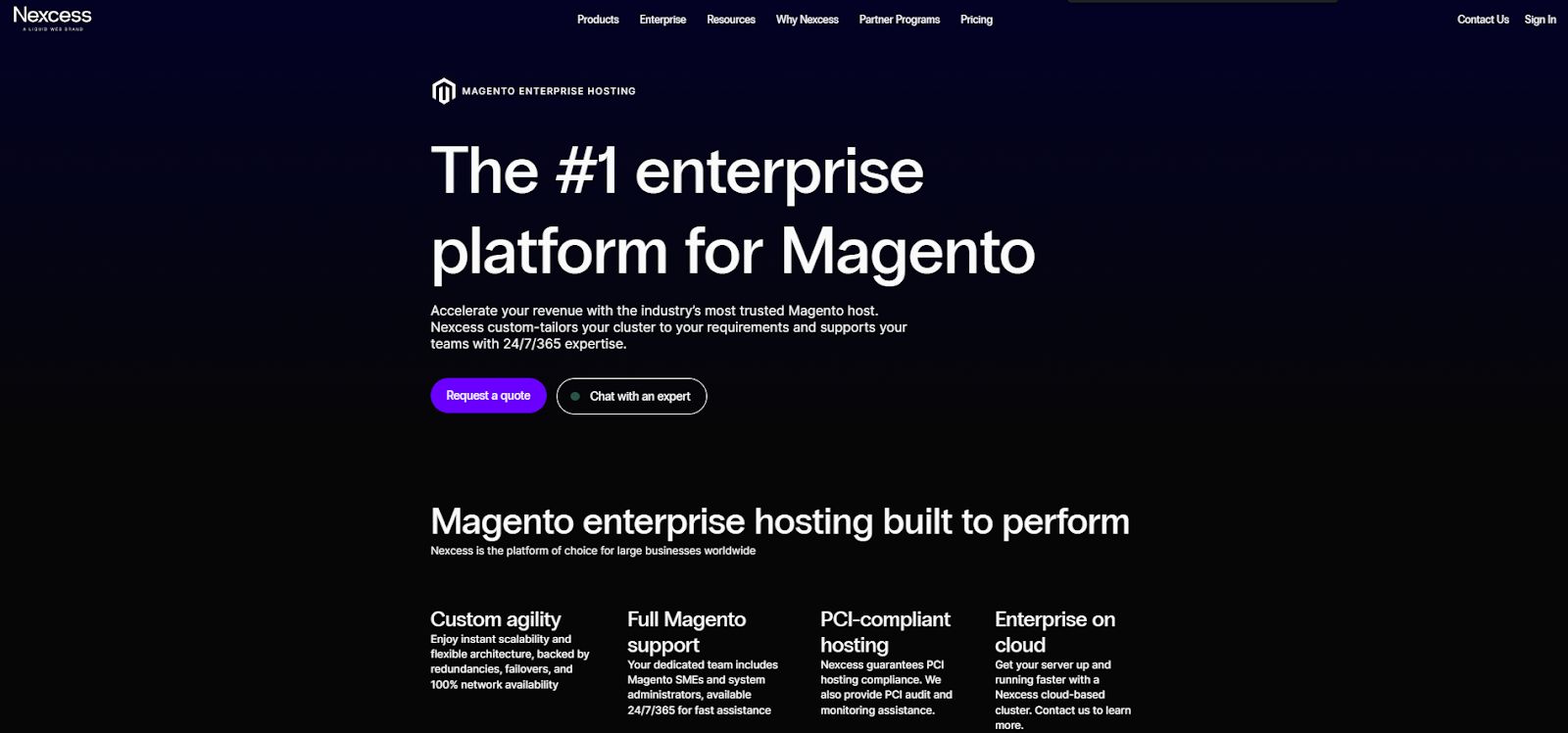
Magento (also known as Adobe Commerce) is one of the most recognized ecommerce solutions available, and Nexcess has high-performance hosting plans for Magento users.
This Magento enterprise hosting solution includes a choice of cloud, load-balanced, or bare-metal servers that can be custom-fitted to meet your requirements. Regardless of your infrastructure choices, you get Payment Card Industry (PCI)-compliant hosting that ensures the security of personal and financial data.
Your Magento servers can come configured with dedicated IP addresses, free SSL certificates, and custom user roles. Scalability is supported, and you can add more server nodes as your business grows.
You can also take advantage of the 24/7/365 Magento enterprise support to help you achieve your performance goals.
ExpressionEngine enterprise hosting
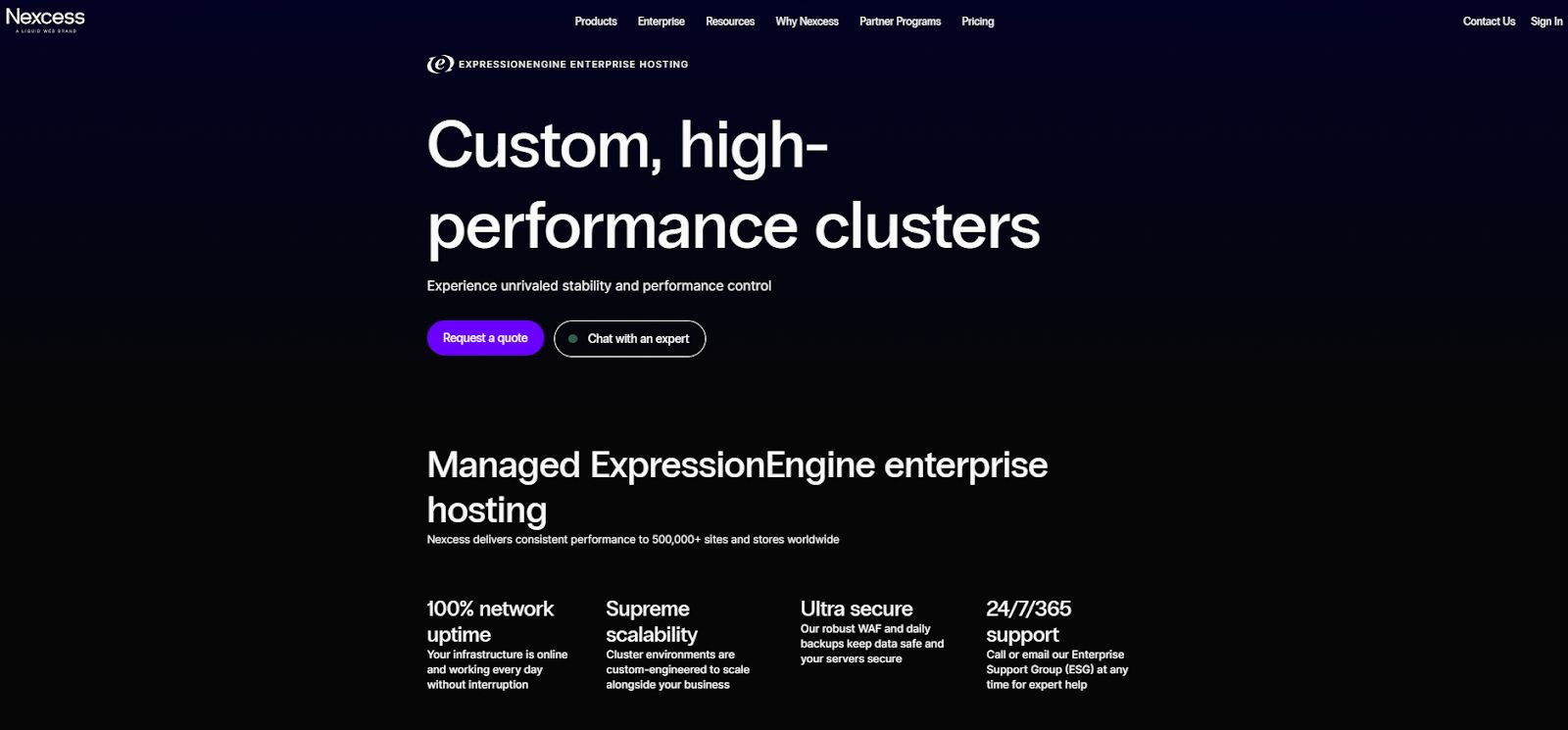
The ExpressionEngine enterprise hosting plans from Nexcess use SSAE-18- and PCI-compliant servers. This ensures the highest standards for handling customer and financial data.
You also get a 100% network uptime guarantee and built-in redundancies to protect against disasters that may affect business continuity. You can customize your server with the help of hosting specialists who will ensure it meets your needs.
Scalability is also a primary feature of this hosting package to ensure your server environment can grow alongside your business.
Craft CMS enterprise hosting
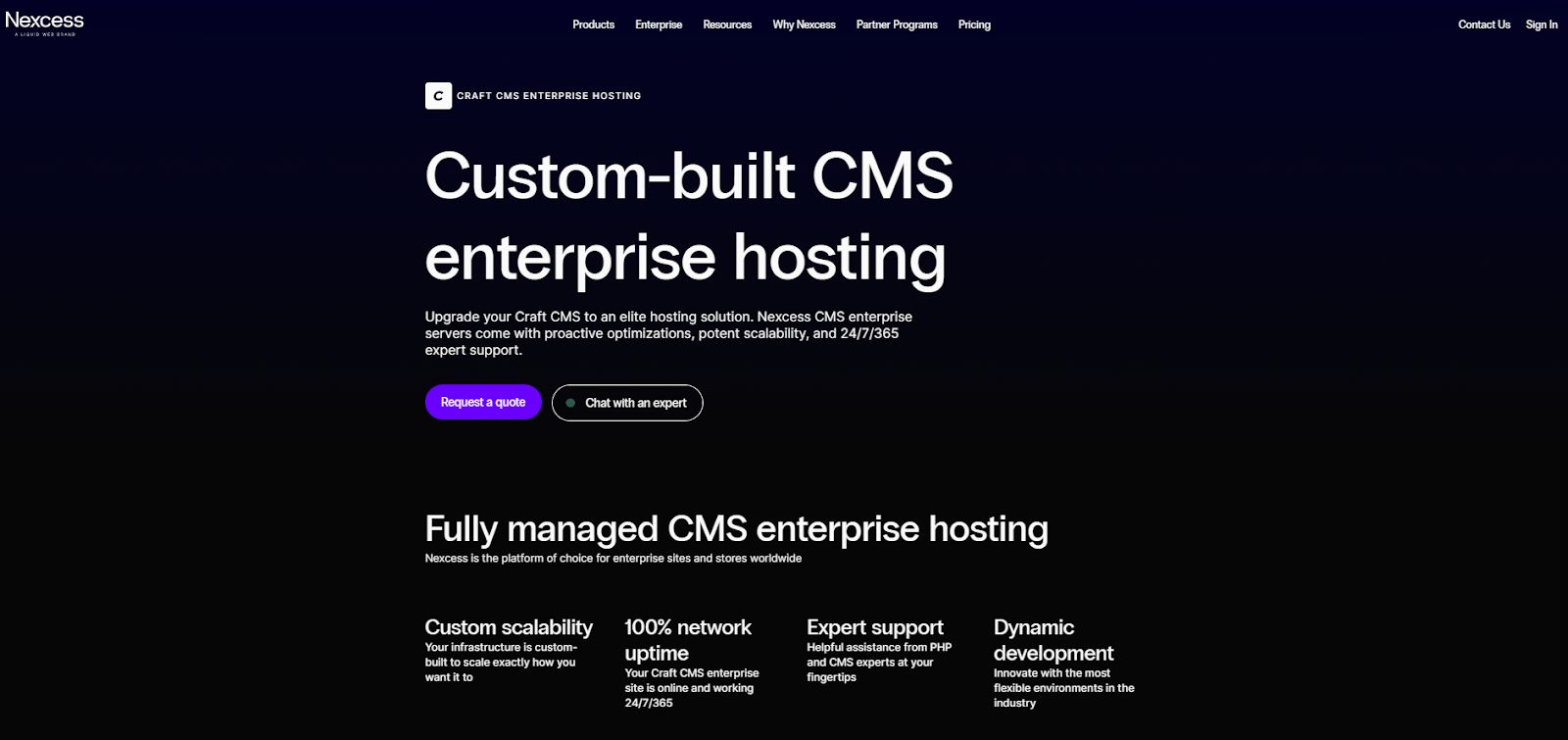
Managed hosting servers for Craft CMS come with all the features you would expect. Nexcess offers expert support, 100% network uptime, and scalability. Plus, the custom-built infrastructure will match the requirements for your performance-hungry website.
You also can modify this hosting plan to support some unique use cases of Craft CMS, such as an ecommerce solution or a headless content management system (CMS).
Final thoughts: Managed vs. unmanaged servers — what’s the best choice for you?
Now that you know the differences between managed and unmanaged hosting, you can choose the best type of hosting for your business. Make sure you pick a hosting service with an excellent reputation and the features your website needs.
If you’ve decided to go with managed server hosting for your business but don’t know where to go for reliable service, why not consider Nexcess?
Our fully managed enterprise hosting plans offer advanced security features, great performance, and excellent support. Contact us today to request a quote.

